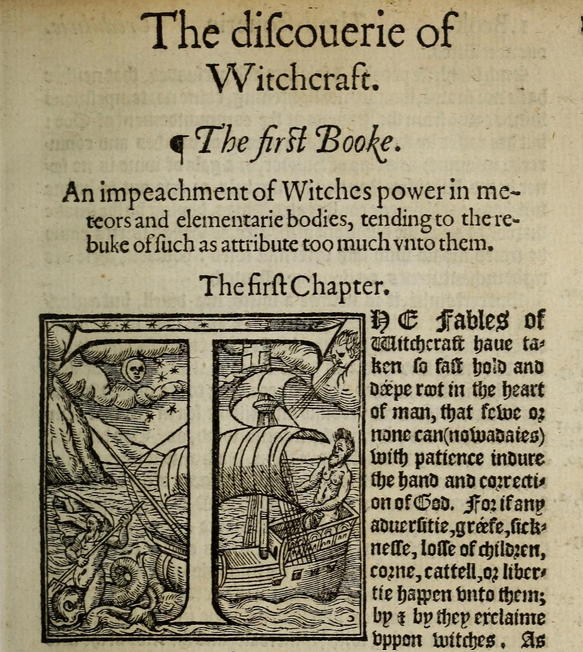In Reginald Scot’s The Discovery of Witchcraft, Book I.1 discusses witches’ control over meteors and elemental bodies (pp. 1-3). Book I.2 discusses the growing belief of men and some church men that witches are omnipotent (pp. 4-6). Book I.3 discusses why men think that witches can hurt children, cattle, and more with not only their words, but their imaginations (pp. 7-9).
From the outset of Book I.1, Reginald Scot aligns witchcraft with fables and claims these stories have taken hold in the hearts of man. According to Scot, people have come to blame problems from sicknesses to their loss of liberty on witches. Ironically, believers of witchcraft have apparently accused Scot of atheism, but he counters that charge here, arguing that belief in witchcraft is un-Christian and denies that God “ordereth all things ac-cording to his will” (C.j.r) Scot also adds that it is not witches that control the weather but instead God. He states that if all the devils in hell were dead and all the witches in England burned or hanged, it would still rain, hail, and storm because of God. Therefore, people should not exclaim upon witches, but instead they should call upon God for mercy.
In Book I.2, Scot states that people are seeking counsel not from God, but instead the devil, and not from physicians, but witches. Scot argues that witches’ claims to open the eyes of the blind are fables. The devil lacks that power, and only God performs great wonders. Further, anyone may unwittingly come under the influence. Scot tells of a parish vicar who believed he had been cursed. The name of a witch is so odious and is so feared that “if the honeſteſt bodie liuing chance to be arraigned thervpon, ſhe ſhall hard-lie eſcape condem-nation” (C.iii.v). But Scot is ultimately optimistic that honest people should be strong enough to fight off witches.
In Book I.3, Scot discusses how old women are easily yet sometimes unfairly accused of witchcraft, and points out that these accusations can become self-fulfilling prophecies: “witches, are women which be commonly old, lame, bleare-eied, pale, fowle, and full of wrinkles; poore, ſullen, ſuperſtiti-ous, and papiſts; or ſuch as knowe no religion” which along with “drouſie minds” the devil can easily turn them to “miſchéefe, miſchance, calamitie, or ſlaughter is brought to paſſe, they are eaſilie perſuaded” (C.iiij.r). Scot further states “Witchcraft and inchantment is the cloke of ignorance: whereas indéed euill humors, & not ſtrange words, witches, or ſpirits are the cauſes of ſuch diſeaſes” (C.iiij.v).

